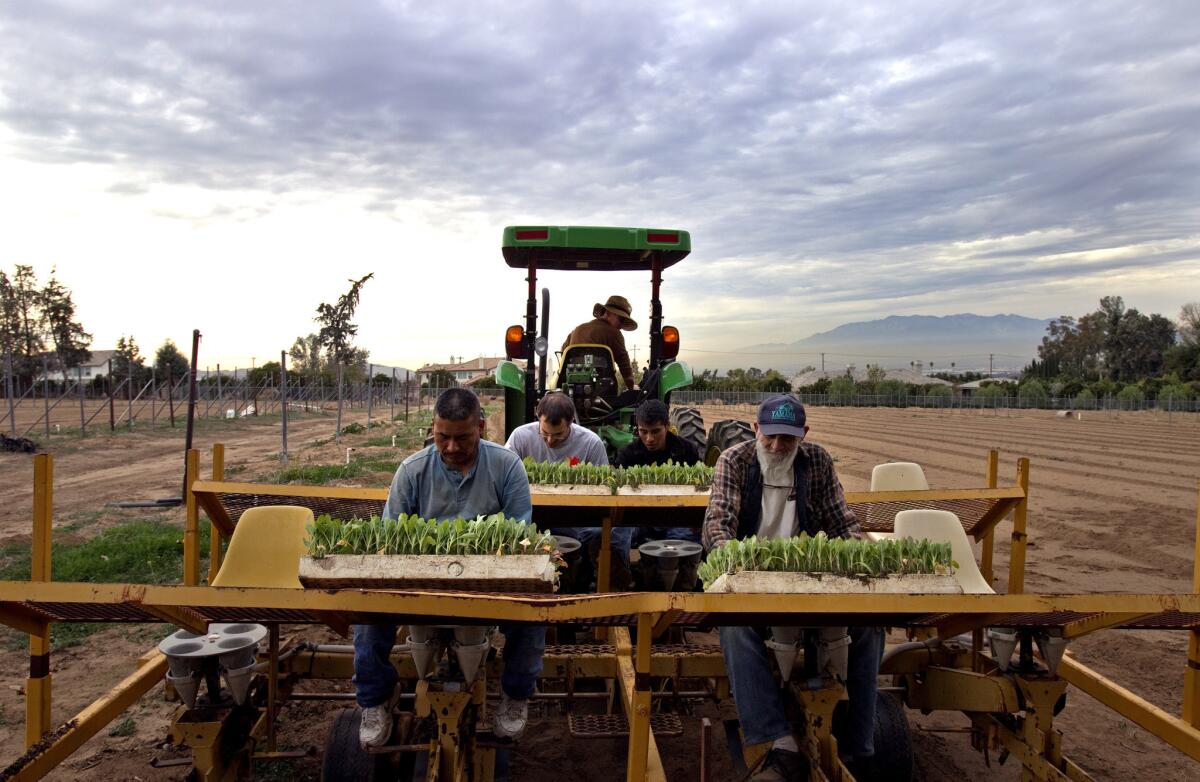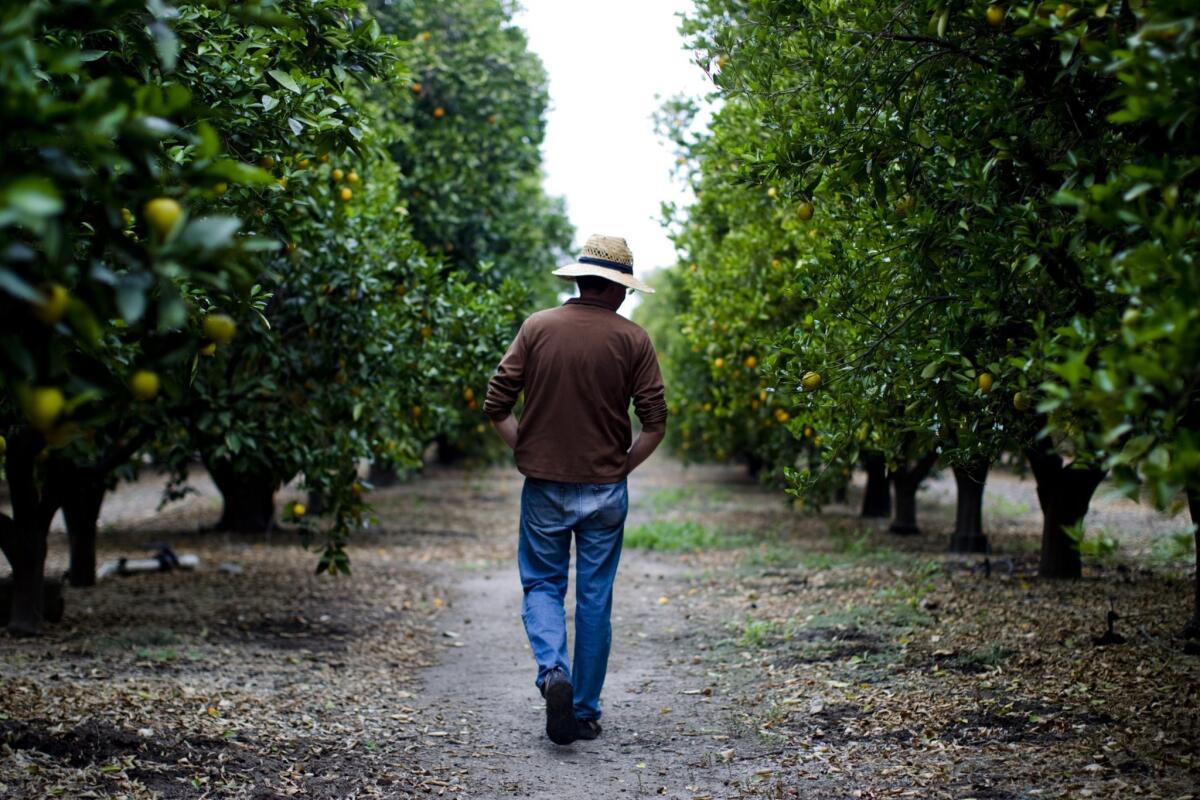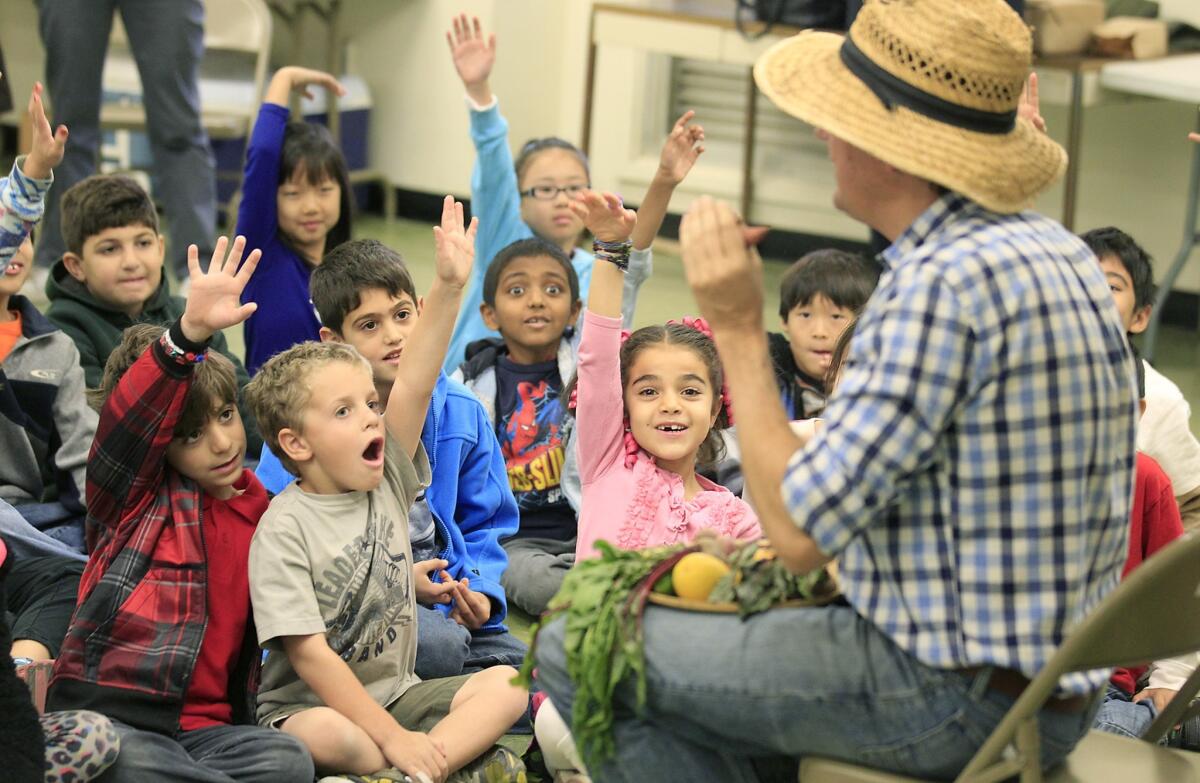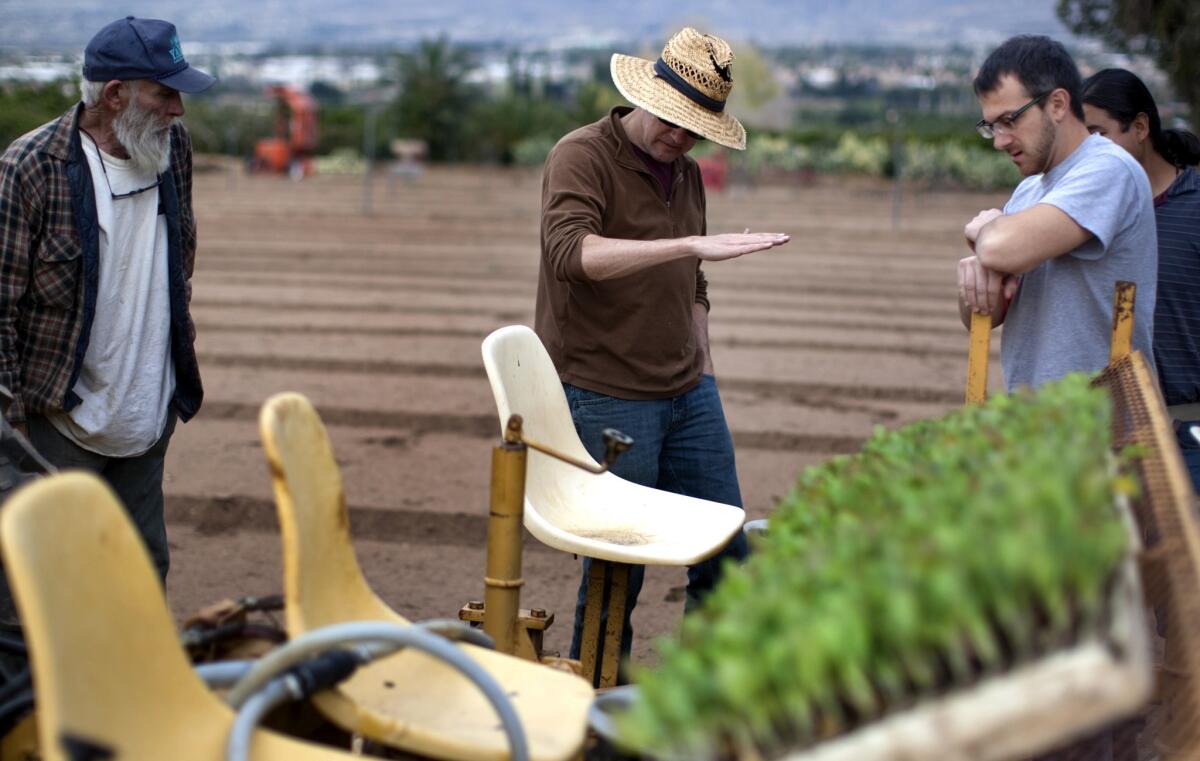L.A. Unified offers lifeline to farmers with healthful eating program

The district is working with local farms that produce vegetables, a program that offers relief as growers switch from fruit over worries about an invasive and deadly citrus pest.
- Share via
Down a dusty road surrounded by orange trees and the rolling hills of Redlands, the farmer in a battered straw hat and worn jeans worked his land, just as his father and grandfather and great-grandfather did before him.
Bob Knight remembers pulling weeds from the soil almost before he could read. He was 6 years old and could barely reach the pedals when he first steered a truck, then began picking and packing the fruit, and checking drip irrigation systems.
Now 54, lanky and long, Knight tends 67 acres bursting with thousands of orange trees bearing sweet Valencias and seedless navels, knobby Gold Nuggets and deep red Moros.
But on this warm January afternoon, this man whose family has painstakingly cultivated citrus for more than 100 years was planting a cauliflower.
Knight is fighting to save his family's livelihood and the farming heritage of Redlands — a city so named for the deep red earth that once produced the nation's largest crop of navel oranges.
And his unlikely ally in the high-stakes gamble is the Los Angeles Unified School District.
In an effort to support local farmers and bring more healthful food to schoolchildren, the nation's second-largest school system has pledged to take whatever high-quality produce Knight and others in his 31-member local farming alliance can grow.
The timing couldn't be better: Knight and other farmers around the world are battling a pest that carries bacteria that is fatal to citrus. The Asian citrus psyllid, an insect the size of an aphid, has been found in all four of the nation's major citrus-producing states and eight Southern California counties. The deadly Huanglongbing disease spread by the pest has also arrived, discovered in a Hacienda Heights citrus tree in 2012.
The Visalia, Calif.-based Citrus Research Program proclaimed the disease a death sentence for a $2-billion industry that produces 80% of the nation's fresh market oranges and 87% of its lemons.
Knight fears that it is only a matter of time before his trees become infected. So he's hedging his bets by turning to vegetables.
L.A. Unified's commitment, Knight said, significantly minimizes the risk of investing more than $100,000 in new equipment and other necessities for what he called a major cultural shift from fruits to vegetables.
"What makes this possible is knowing there will be an institutional partner," Knight said. The district "gives us that stability that makes this whole transition more feasible and less stressful."
He paused, looking out at his trees as wispy white clouds cast shadows over the dust-colored canyons.
"They should rename this area LAUSD," he said.


Knight walks among his orange trees in Redlands. As the trees age, they produce smaller fruit, and they are being threatened by an invasive pest, so Knight is switching to growing vegetables. More photos
The partnership between L.A. Unified and Knight's alliance of San Bernardino County farmers began two years ago, brokered by Sean Leer of Gold Star Foods Inc., a school food distributor based in Ontario.
Leer and David Binkle, L.A. Unified's food services director, were charged with carrying out the Los Angeles Board of Education's 2012 directive to buy more school food from producers within 200 miles of the city, with 5% of produce specifically from small- to medium-sized farms.
The district became Los Angeles' second institution — city government being the first — to pledge to support local purchasing in a "good food" program developed by the Los Angeles Food Policy Council. Besides oranges, the district has shifted to sustainably grown wheat from Fresno rather than the Midwest, and beef from Chino instead of Cincinnati, among other purchases.
I was a cog in a huge machine and in the end, it felt empty.”— Bob Knight, farmer and ex-engineer
Even before the pest arrived in 2008, Knight's orange business was struggling. As trees age, the fruit becomes sweeter but smaller — less suitable for the retail market, he said, which demands large oranges. At the same time, the growing domination of the industry by highly efficient megagrowers and foreign competitors in Australia, Chile, Spain and South Africa were driving down prices.
But Binkle and Leer, scouring the region for local producers, discovered Knight and began placing orders that doubled his alliance's business overnight, taking half their orange crop for the district's 600,000-plus daily meals. Last year, the farmers sold more than $171,000 of oranges to L.A. Unified through Leer.
Knight credits the deal with single-handedly keeping a quarter of his farmers in business.
"It changed our world," he said. "Without [L.A. Unified], some of the growers would have poked along and eventually sold out."
Now Binkle and Leer have begun discussing vegetables with Knight: Persian cucumbers, cauliflower, kale and fingerling potatoes. Leer said the district would work with the farmers to ensure high quality and a fair price.
"We've committed to this journey," Leer said. "As soon as they tell us what they can do well, we're committed to carrying this through to the child's plate. We try to eliminate the risk so they can be confident that they'll get a return on whatever they put in the ground."


Knight quizzes Castlebay Lane Charter School students on the health benefits of sweet potatoes as he shows off some of the fresh produce he grows on his Redlands farm. (Brian van der Brug / Los Angeles Times) More photos
The shift to vegetables isn't the first gamble for the Knight family farm.
Launched in the 1880s by Knight's great-grandparents, who fled famine in Ireland, the family farm hummed through the 1940s, part of Redlands' burgeoning citrus empire. Then root fungus hit scores of trees, devastating the industry. When property values soared, many farmers sold their land. And the rise of agribusiness began squeezing out small growers, Knight said.
To survive, Knight's father took a leap of faith in the 1970s and converted some of his orange groves to New Zealand kiwifruit. The then-rare fruit was a hit; revenues helped pay for Knight's tuition at Columbia University, where he majored in engineering and economics. By the early 2000s, however, production plunged to one-seventh of its peak yields when rising temperatures threw off growing patterns. Once again, the farm was in peril.
Knight, however, had long left the land and was trotting the globe as a telecommunications engineer. He was filled with wanderlust — instilled, perhaps, by his voracious reading of Russian classics and the action-packed adventures of the Hardy Boys and Capt. Horatio Hornblower. Knight worked in Indonesia, Japan and Saudi Arabia until the 9/11 attacks made life too tense to be an American in Riyadh.
He returned to Redlands with his wife, Aki Nakamura, and their two children, Anna and Kaito. And he found a new appreciation for his land.
"In a huge global corporation, no one knew what I did. I was a cog in a huge machine and in the end, it felt empty," he said. "As a farmer, you make healthy food. You're building something your family and community can inherit."

Now Knight is an agricultural evangelist of sorts, spreading the gospel of local farming to secure its future. He and his alliance have launched a program, oldgrovefarmshare.com, which delivers weekly boxes of locally grown produce. The farmers also make regular visits to schools as part of a national movement to educate students about the importance of locally grown food.

Knight talks with workers to try to adjust a transplanter to plant cauliflower seedlings on Jan. 7. More photos
During a recent visit to L.A. Unified's Castlebay Lane Charter School in Porter Ranch, Knight donned his straw hat and regaled more than 700 students throughout the day with stories about his farm, his dogs and the "superpowers" of vegetables. Beets to help stop bleeding. Carrots to see better. Cucumbers to fill you up without making you fat. Then he invited each student to choose three items from the farmers market he had set up.
Akasha Dukkipati, 7, chose a carrot, a cucumber and a beet. "I bleed a lot, so I'm going to eat this beet instead of wear a Band-Aid," she said.
But even with L.A. Unified's support, the future of local farmers is hardly assured. For starters, Knight said, he has to be able to produce vegetables to bridge the gap between the possible death of his trees and the development of citrus that is resistant to the disease. But vegetable growing is more complex. With oranges, you plant a tree, watch for weeds and gophers, and it pretty much bears fruit every year.
Vegetables have multiple life cycles, more precise harvesting schedules and a whole new world of equipment — like the secondhand transplanter that Knight and his six-man crew struggled with during his recent cauliflower-planting day.
The machine, rigged to a tractor, was supposed to place the cauliflower seedlings into long mounded rows and close up the dirt around them. But one of the pieces broke, causing the plants to drop on top of the dirt instead. And the contraption — a total $50,000 investment — had to be periodically adjusted to the slant of the land.
Knight watched his crew start and stop, making adjustments and repairs. Frustration lined his face.
"If this doesn't change, we'll probably end up doing a lot more hand planting," he said. "But we'll work these issues out.
"Otherwise," he said, looking out at his land, "this will all go away."
Follow Teresa Watanabe(@TeresaWatanabe) on Twitter
Follow @latgreatreads on Twitter
More great reads
Animal wranglers add themselves to endangered species list

We're not going to be doing it that much longer. It's going to go away. ”
Sign up for Essential California
The most important California stories and recommendations in your inbox every morning.
You may occasionally receive promotional content from the Los Angeles Times.









